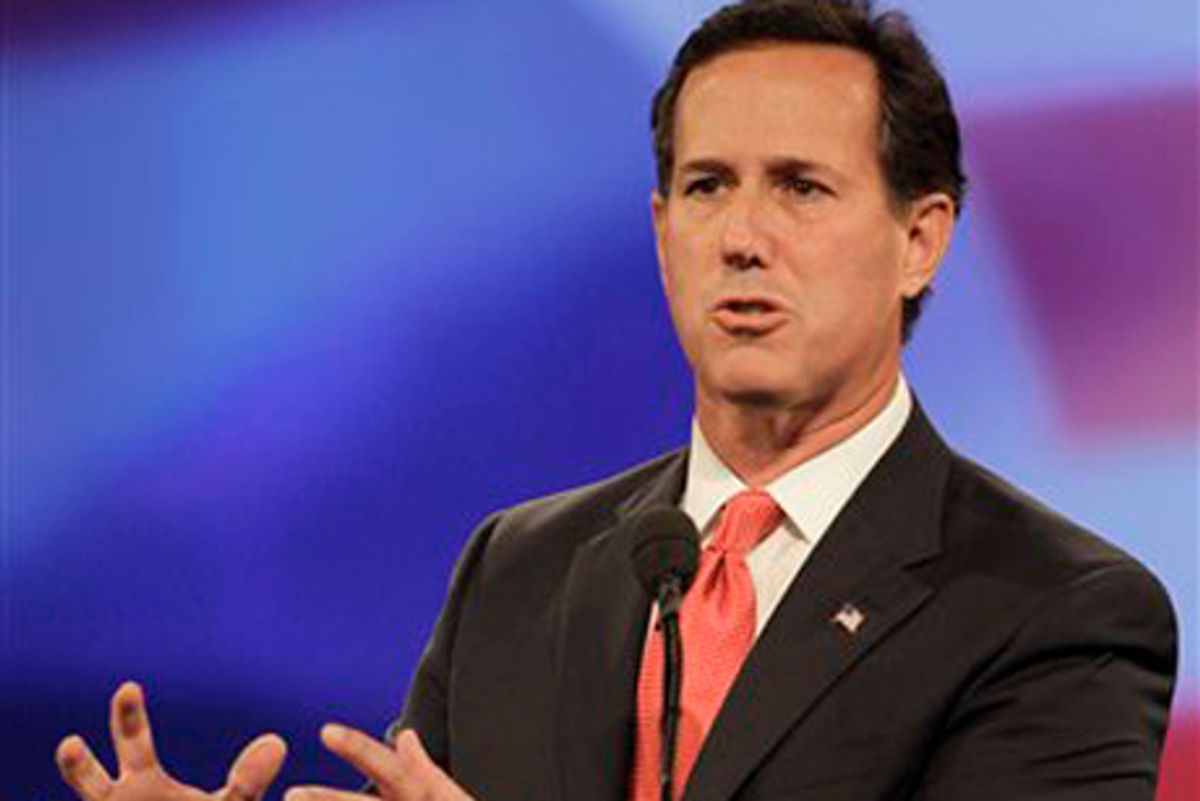Rick Santorum has already won a moral victory simply by earning top-tier status in the Republican presidential race. Until the last week of 2011, he was the only candidate never to show even a hint of life in national or key early state polling and seemed destined to post a low single-digit showing in Iowa, then end his campaign.
But now he’s caught fire in Iowa, surging to third place in the final Des Moines Register poll – with Republican voters apparently breaking his way in droves in the past few days. After running what looked for a long time like one of the more futile White House campaigns in history, Santorum suddenly has a real chance to win the lead-off caucuses on Tuesday.
Which raises a question that seemed laughable until very recently: What would it take for Santorum to win not just Iowa but also the Republican nomination?
Let’s start with what he needs out of Iowa this week. The Register poll shows Mitt Romney in first place with 24 percent, followed by Ron Paul at 22 and Santorum at 15. But the poll was conducted over four days late last week, with Santorum’s support more than doubling in the final two days, when he averaged 22 percent.
Obviously, an outright victory would be Santorum’s ideal scenario, but early primary and caucus tests are often about the expectations game as much as literal order of finish. This is how, for instance, Gary Hart “won” the 1984 Democratic caucuses in Iowa even though he finished 33 points behind Walter Mondale – a result that propelled Hart to a real victory in New Hampshire a week later.
Santorum needs the big story coming out of Iowa to be that he has established himself as the default conservative alternative to Romney – and that Newt Gingrich, Rick Perry and Michele Bachmann have all been marginalized. For this to happen, Santorum will need to clearly separate himself from the non-Romney/Paul candidates, because there’s a big difference between a result like this:
Romney 27%
Paul 25%
Santorum 14%
Perry 12%
Bachmann 10%
Gingrich 9%
And one like this:
Romney 25%
Santorum 24%
Paul 22%
Perry 9%
Bachmann 7%
Gingrich 6%
The key here is that Santorum doesn’t need to finish ahead of Romney; he just needs to be close to him and well ahead of the rest of the pack. With Perry, Bachmann and Gingrich faring poorly, their support in subsequent states would drop and prominent party leaders would be scared off from endorsing them. (One or more of them might even drop out after a bad Iowa result.) This would create an opening for Santorum to gobble up their supporters and rally the conservative base around him.
Then the action would shift to New Hampshire, where Romney is the prohibitive favorite – meaning that even a lopsided victory might not generate much momentum for him. Santorum’s main challenge in the Granite State, then, would be to downplay expectations and to finish well ahead of Bachmann, Perry and Gingrich (if they’re still in the race). An added bonus for Santorum would be a surprisingly strong finish by Jon Huntsman, who has bet his campaign on New Hampshire and who tends to appeal to Republicans who would otherwise back Romney.
That would bring us to South Carolina, which would be an absolute must-win contest for Santorum. The state’s GOP electorate is somewhat similar to Iowa’s, with a heavy (60 percent of the 2008 primary electorate) share of evangelical Christians – the sort of voters who tend to be suspicious of Romney and who Santorum has been pushing hard to win over.
Given what a poor match for South Carolina Romney seems to be (he garnered just 15 percent there in ’08), he will pretty much end the race on the spot if he can pull out a victory, even if it’s by a tiny margin. This was how John McCain, who faced similar suspicions from South Carolina’s GOP voters, finally broke away from the rest of the field four years ago after winning the state by three points
But McCain caught a big break in that ’08 contest, with his main conservative rival – Mike Huckabee – losing support to another conservative candidate, Fred Thompson, who ended up taking 15 percent in the primary. Thompson had already been humbled in Iowa and New Hampshire and was clearly not going to win the nomination, but his presence may have kept Huckabee from catching McCain and changing the course of the GOP race.
This is why it’s so pivotal that Santorum marginalize Perry, Bachmann and Gingrich in Iowa, and ideally force them to drop out of the race. The more relevant they are in South Carolina, the more Santorum will be at risk of suffering the same fate as Huckabee.
If Santorum were able to beat Romney in South Carolina, he would cement himself as a serious threat to win the nomination. The question then would be how the GOP’s most influential voices – think Fox News, Rush Limbaugh, and other media outlets and personalities, along with key elected officials – would react to Santorum’s viability. Would they deem him an unfit nominee and work to undermine him, and to prop up Romney? Or would they flock to the Santorum bandwagon?
Their response would be the single most important factor in the next contest, the January 31 Florida primary. Romney, on the heels of a South Carolina defeat, would be seen as being on the ropes. With a win, he would undo that impression and reassert himself as the national frontrunner. But if Santorum were to pull off a victory, he’d enter February in a position no one ever thought he’d be in: the favorite.

Shares